Toyota’s most popular vehicle, everyone’s favourite, and a first car for many people out there.
Celebrating its 25th anniversary, what makes the Yaris so special?
In this detailed car review of the hybrid variant, our experts explore whether it maintains the traditional Yaris virtues and how it stands up against other top vehicles in its class.
The Final Verdict
The hybrid version of the Yaris does a great job carrying forward the excellence that the original model is known for.
Its class-leading efficiency (60–70 mpg), combined with outstanding reliability, makes it a top contender in the small vehicle category.
It’s no exaggeration to say that it’s the most cost-effective choice in this segment.
What is in the Review?
Retail Price: £25,020.00
Savings: £4,588.00
Motorfinity Price: £20,432.00
Specific Trim: 1.5 Hybrid Design 5dr CVT
A Quick Overview
9.2-9.7
Acceleration 0-62 mph
114-129
Brake Horse Power
109 mph
Top Speed
67.3 - 70.6 mpg
Fuel Economy
9.0 - 10.5 inch
Touchscreen
Things We Liked The Most
- Impressive Real-World EfficiencyDelivering between 60 and 70 MPG (miles per gallon) in real-world driving conditions, it surpasses many competitors in the small hybrid car segment.
- Reliable Hybrid SystemBacked by a comprehensive 10-year warranty with servicing, it provides exceptional peace of mind for long-term ownership.
- Well-Equipped Modern TechPhysical climate controls, latest safety features, and Apple CarPlay/Android Auto integration, (phone connection system), it provides all the essential modern conveniences without unnecessary complexity.
About the Toyota Yaris Hybrid
The Yaris Hybrid is Toyota’s smallest self-charging hybrid. It’s a practical small car that offers all the hassle free hybrid benefits.
What has changed in the 2025 variant?
For the 2025 variant, Toyota opted for a thoughtful refresh rather than radical changes.
The key update is that the 2025 model now offers a more powerful 129bhp option alongside the tried-and-tested 114bhp version. Both variants feature self-charging hybrid technology.
Aside from a new alloy wheel design and the introduction of a new paint option, there are no major changes to the exterior.
Inside, you’ll find the most noticeable updates. A new 10.5-inch touchscreen (available only on the top-spec model) looks sleek and modern, while higher trims get an impressive 12.3-inch digital instrument cluster.
Overall, the cabin now looks far more contemporary. More on this to follow.
Is the Yaris Hybrid worth buying in 2025?
The Yaris has seen significant improvements, but with so many choices in the small hybrid car segment, should you buy one?
If you need a reliable hybrid for everyday use, the answer is yes.
It offers exceptionally low running costs compared to its rivals, strong residual values (how much the car is worth after a few years), and proven durability.
The technology strikes a good balance between modern features and essential functions.
Reconsider if mileage and longevity aren’t your main priorities. If you drive infrequently, prefer a more luxurious interior, or need greater practicality (like a boot capacity over 350L, which is rare in small cars), you may want to explore other options.
Comparison with the Toyota Yaris Cross
Toyota offers a small SUV variant of the Yaris, known as the Toyota Yaris Cross.
See the following table for detailed differences.
To note: Prices are subject to change. Please visit pages of respective models for current pricing information.
| Yaris Hybrid From £22,640 | Yaris Cross From £27,130 | |
|---|---|---|
| Length | 3,940mm | 4,180mm |
| Boot Space | 286L | 397L |
| Fuel Economy | Up to 70.6mpg | Up to 62.8mpg |
| Position | Standard height | SUV height |
To learn more about the Yaris Cross, check out our detailed review of the compact SUV variant of the Yaris.
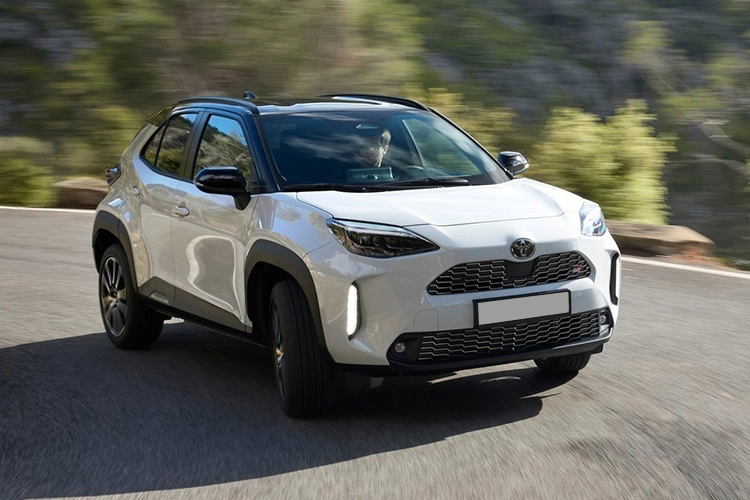
Comparison in the small car category
The small hybrid car category is saturated, and to make a lasting impact, vehicles must outperform in various aspects.
The Toyota Yaris leads the pack as the most well-rounded option.
Its strongest competitor in the UK market is the Mazda 2, which is essentially built on the same technology as the Yaris but comes with a shorter warranty and lacks the strong reliability reputation of the Yaris.
Another strong competitor is the Honda Jazz, which stands out as the practical choice with its class-leading interior space and clever seating configurations.
The Suzuki Swift is a key competitor in the category. It offers an engaging driving experience in a lighter package with impressive fuel economy from its mild hybrid system.
Ultimately, the choice comes down to priorities: The Yaris for proven hybrid efficiency, the Mazda 2 for value, the Jazz for space, or the Swift for driving enjoyment at a budget price point.
See the following table for a comprehensive comparison of how the Yaris competes with its rivals in this category:
The Hybrid Technology
The overall hybrid experience
The Toyota Yaris features a regular hybrid system combining a 1.5-litre three-cylinder petrol engine with an electric motor and battery, all working through a CVT automatic transmission.
Just like other Toyota models, the Yaris Hybrid offers a genuinely impressive hybrid experience.
For daily city drives, it can run on electric power up to 80% of the time, seamlessly switching between electric and petrol modes.
The hybrid system delivers a real-world 65–70 mpg without needing to be plugged in, making it one of the most efficient non-plug-in cars available.
How good is the charging?
The Yaris uses the self-charging hybrid technology. It is straightforward yet effective.
Drawing power from regenerative braking and the 1.5-litre petrol engine, it delivers remarkably efficient performance.
This effective combination of automatic charging and efficient energy recovery means you never need to plug in, while still benefiting from hybrid technology.
Long-term reliability insights
If you’re concerned about battery lifespan, there’s no need to worry—it should be the least of your concerns.
The system is designed to last the lifetime of the car, with Toyota confidently offering a 10-year/100,000-mile warranty (with regular servicing).
Real-world evidence from earlier versions consistently shows batteries lasting 15–20 years or exceeding 200,000 miles, with many fleet vehicles surpassing half a million miles on their original batteries. This new hybrid technology in the Yaris Hybrid is expected to continue that legacy and potentially go even further.
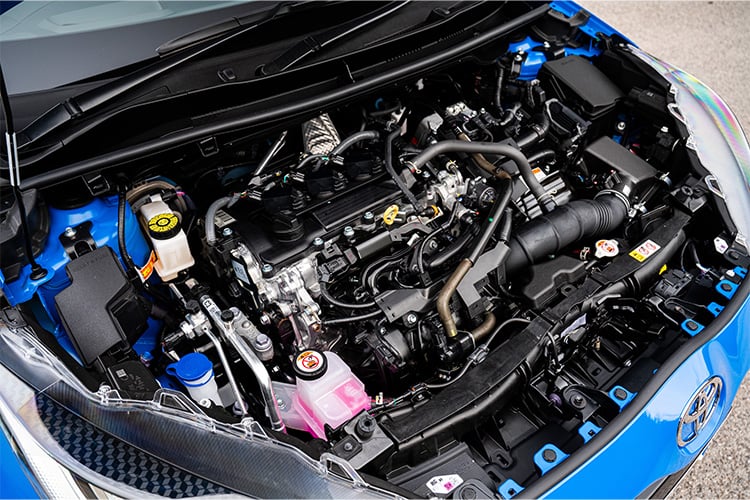
What is a solution if you don't drive the hybrid frequently?
If you’re buying the Yaris as a second car and don’t expect to drive it frequently, there are a few simple steps you can take to prolong the battery’s lifespan.
You can use an inexpensive smart charger, which costs between £50 and £100, or keep a compact lithium jump pack as a backup.
The main hybrid system remains unaffected by irregular use. It’s only the 12V battery that needs attention, so a regular 10-minute drive will not only maintain the battery charge but also help the hybrid system perform its built-in checks.
Unlike older hybrids, the Yaris’s proven system is otherwise remarkably low-maintenance, only requiring basic fluid checks (engine oil, coolant, brake fluid) during periods of inactivity.
What are the differences between the two hybrid variants?
The two versions are designed to meet different demands, and both do a good job of fulfilling their intended purposes.
The 114bhp version prioritises efficiency (70.6 mpg) with a 0–62 mph time of 9.7 seconds.
The punchier 129bhp variant offers more responsive performance, achieving 0–62 mph in 9.2 seconds, with slightly lower fuel economy (67.3 mpg). Both models use Toyota’s proven 1.5-litre hybrid system, just tuned differently
Does motorway driving affect the efficiency?
Primarily an urban car, the Yaris performs well on motorways too, although constant high speeds can impact overall efficiency.
At higher speeds, the petrol engine does more work as the hybrid system has fewer chances to recover energy through regenerative braking ( Using braking energy to charge the battery).
You can still expect around 50–55 mpg on motorway journeys, which still remains class-leading.
The CVT transmission and its effects
The CVT (Automatic gearbox that shifts smoothly without fixed gears) pairs smoothly with its hybrid system. It prioritises efficiency and provides seamless, stepless acceleration.
It switches effortlessly between electric only driving and petrol power, especially in city traffic, enhancing both fuel economy and quiet operation.
Exterior - is it Impressive for a Small Hatchback?
The exterior is impressive for a small hatchback, boasting a sportier and more aggressive stance than many rivals.
Compared to its competitors, the Yaris breaks away from the typical design constraints of small vehicles.
It stands out even from a distance, with its bold front grille, sharp LED headlights, and dynamic lines along the sides, making it both eye-catching and contemporary.
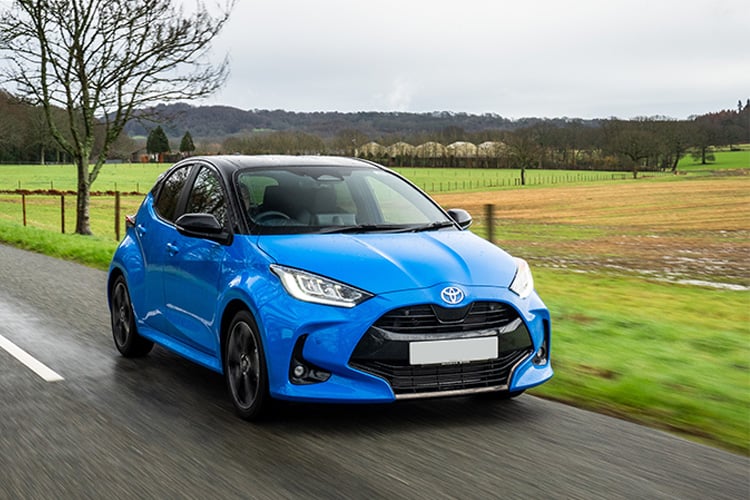
The body and build quality
Compared to other vehicles in its segment, the Yaris features a lighter, stiffer body and solid build quality. It upholds Toyota’s legacy for superior craftsmanship.
While the Honda Jazz is praised for its reliability and practical design, it lacks the sporty and refined appearance of the Yaris.
The Renault Clio, on the other hand, leans towards an upmarket feel, thanks to its sleek lines and signature LED lighting, but it doesn’t quite match the Yaris’s dynamic, agile stance.
Meanwhile, the Mazda 2 is well-built, though its simpler platform doesn’t quite reach the Yaris’s level of innovation or stylish flair.
The lighting:
LED headlights come as standard on the Design trim and above. These LEDs are clear and crisp, significantly enhancing the driving experience in low-light conditions.
The DRLs also contribute to the vehicle’s striking, modern look, adding a touch of style while remaining functional.
The modern tech is top-notch too, especially the 'Follow Me Home' feature. This function keeps the Yaris’s headlights on for 30 seconds after you’ve locked the car (extendable by pulling the light stalk), illuminating your path before automatically switching off.
Wheel designs and sizes
The Toyota Yaris’s wheel options genuinely enhance its sporty character, ranging from 16 to 18 inches. The 16-inch wheels on base models prioritise comfort but look a bit modest, while the range-topping 18-inch GR Sport wheels look fantastic but noticeably firm up the ride.
The 17-inch wheels are definitely the best choice. They strike the perfect balance between aesthetics and comfort, filling the wheel arches nicely without compromising ride quality.
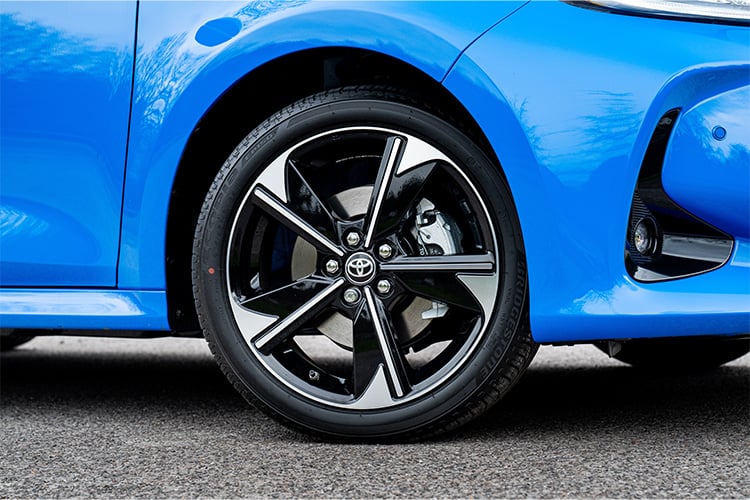
The Interior Design Features - Do They Maintain the Boldness That the Exterior Offers?
The overall design - Is it modern or minimal?
The smart layout hits the sweet spot - not too modern, not too basic.
The big screen (22.9 cm or 26.7 cm based on model) sits up high where you can see it clearly, with simple buttons below to control heating and cooling.
Top-range models come with a fancy 31.2 cm digital display behind the steering wheel.
How good is the interior material?
The inside is sturdy but not fancy.
While the cheaper bits show in lower areas, smart touches like diamond-stitched seats and textured panels add a nice feel.
The layout makes perfect sense, with easy-to-read dials and controls within reach.
Though not as posh as the Renault Clio, it's built tough for daily use rather than just looks.
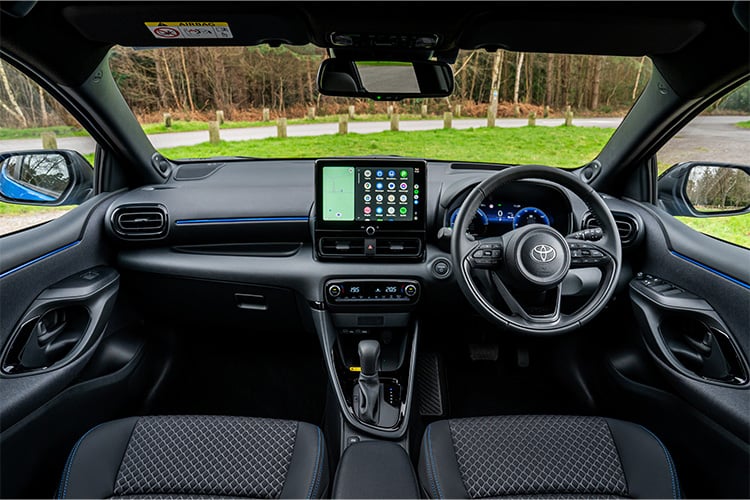
The interior comfort and seating design
The seats and comfort level are good.
Up front, you sit high with plenty of seat controls.
Premium models and above add handy back support.
The driver's seat moves up and down, and the steering wheel adjusts more than you'd expect at this price. GR Sport models have special sports seats with extra side grip.
Unlike the Honda Jazz with its folding Magic Seats or the Renault Clio's softer dash, the Yaris keeps things simple but solid - built to last years of daily use.
Interior storage and practicality
The boot has plenty of useful space.
Weekly shopping or two mid-sized cases fit easily. Back seats split and fold, while the flat floor makes loading simple.
Inside, you'll find good storage: a decent glovebox, drink holders, and a hidden arm-rest box.
Is the interior too noisy?
In town, the Yaris Hybrid runs quietly, especially on electric power.
The engine stays peaceful in normal use but pipes up during quick bursts of speed. While motorway trips bring some wind and tyre sounds, they won't bother most drivers.
For the quietest ride, stick with standard wheels - bigger ones make more road noise.
Driving Quality
The Yaris Hybrid handles city roads with ease.
It moves quickly from a stop, with smooth gear changes.
The car feels light and easy to steer, giving a comfortable ride on standard wheels. It tackles both city streets and country bends confidently.
How good is the vehicle control and handling?
The Yaris Hybrid handles brilliantly, turning tighter than both the Honda Jazz and Mazda 2 (5.2m circle).
It steers better than the Renault Clio and feels as solid as the VW Polo.
At low speeds, power comes smoothly and instantly. The car feels nimble in town yet steady on motorways - like a bigger car.
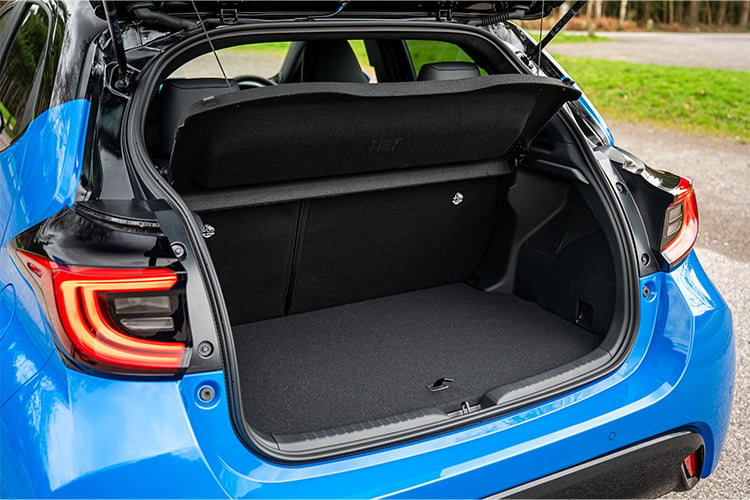
How good is the driver position and visibility?
The Yaris puts you in a perfect spot to see the road.
You sit slightly higher than a normal car but not as tall as an SUV.
The wide front window and thin pillars give you a clear view ahead. Pricier models add blind spot warnings for safer lane changes.
Transmission and power delivery
The Yaris Hybrid moves smoothly, thanks to its special gearbox.
Power comes easily in town using the electric motor, while the petrol engine helps when you need more speed.
It handles both city streets and motorways well.
What do Yaris Customers Say?
We conducted a comprehensive survey of our Motorfinity customers who purchased the 2025 Toyota Yaris Hybrid to gather unbiased, real-world feedback about their ownership experience.
Key purchase factors
Our survey revealed consistent patterns about what drove customers to choose the Yaris Hybrid. Every respondent highlighted three primary factors : reliability, fuel efficiency, and competitive pricing.
The data shows that 100% of surveyed customers cited Toyota's reputation for reliability as a crucial decision factor.
The promise of excellent fuel economy, appealing in today's economic climate, was equally influential.
Additionally, our customers appreciated the significant savings, with an average of £4,168 off the retail price through Motorfinity.
How do drivers rate their Yaris Hybrid Experience?
After experiencing the Yaris Hybrid in daily use, our customers reported high satisfaction across several key areas.
The vehicle's handling and stability received unanimous praise, with all respondents giving it the highest rating.
Ride comfort and acceleration scored exceptionally well, particularly among urban drivers.
The real-world fuel efficiency lived up to expectations, with users consistently reporting 60-70 mpg in mixed driving conditions.
These attributes have contributed to a remarkable 100% satisfaction rate among our surveyed owners, with appreciation for the vehicle's smooth hybrid operation and responsive steering.
Customer Testimonials
Below are our customers' comments about the Yaris Hybrid. It includes some key suggestions about what they want from future Toyota Yaris Hybrids.
"Such an easy car to drive with brilliant fuel efficiency."
Suggested: Heated seats option
"It looks good and is fun to drive. The whole purchase experience was incredible."
Suggested: Interior lighting improvements
"Great MPG and road handling performance."
No improvements suggested
What about long term ownership?
The Toyota Yaris Hybrid demonstrates strong owner loyalty, with two-thirds of buyers planning to keep their vehicle for 3-5 years. This preference for longer ownership suggests high confidence in the vehicle's reliability and value retention among key workers.
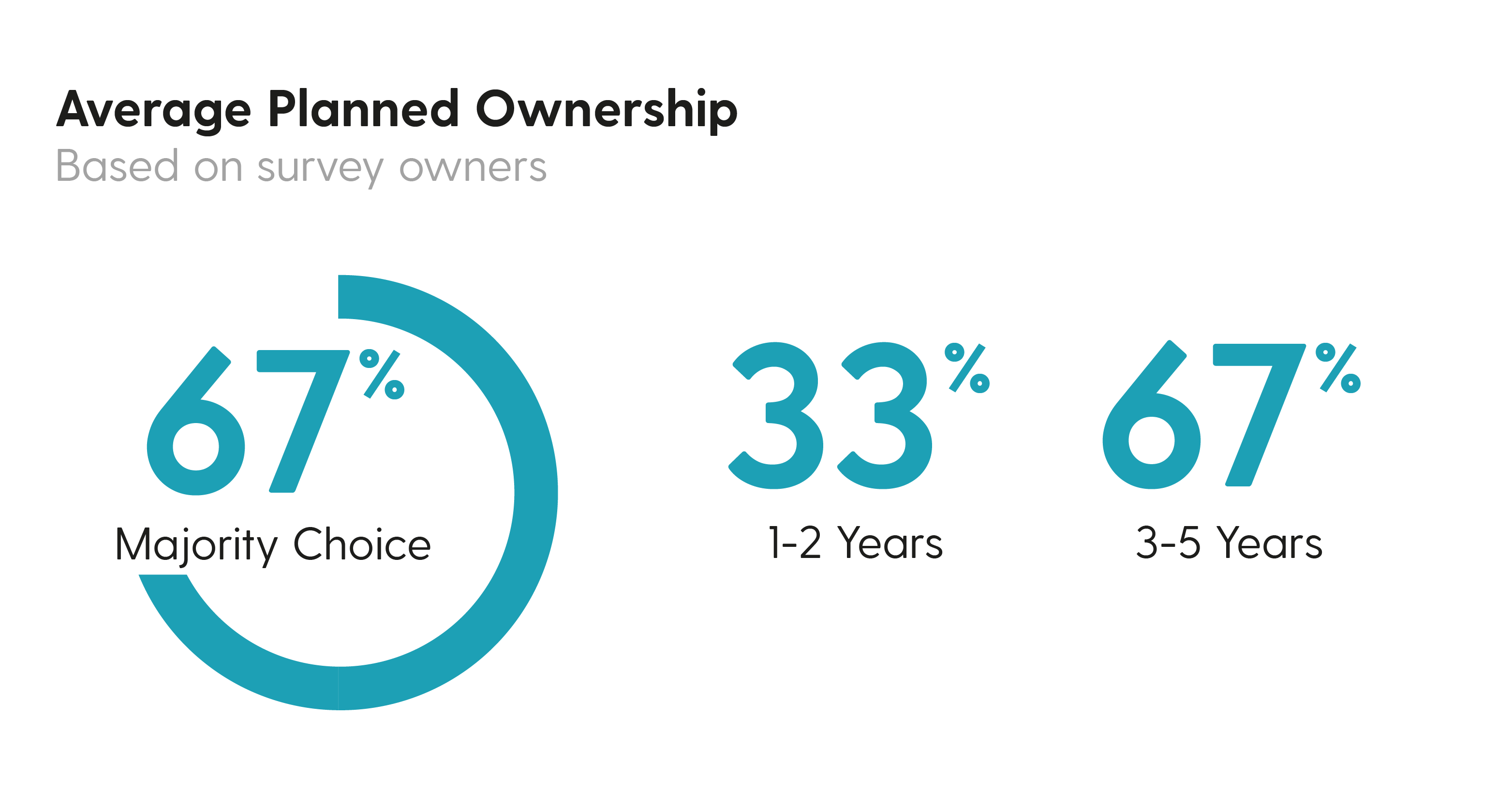
The Resale and Depreciation Value
How strong is the residual value?
The Yaris Hybrid's strong resale value is clear - it keeps 71% of its price after three years, helped by its Warrantywise award for UK's most reliable used car.
How competitive is the overall price?
The Yaris Hybrid costs more than a Clio but less than a Honda Jazz.
The price makes sense given its standard hybrid system, proven reliability, and strong resale value.
The running cost impact
The Yaris Hybrid keeps costs down with its efficient daily running.
It sits in insurance groups 13-14, notably cheaper than the Jazz at group 19.
The yearly road tax (annual car tax based on emissions) costs £155, helped by low CO₂ emissions of 92-98g/km. Toyota's warranty offers peace of mind, while strong resale values help with total ownership costs.
Price
The Yaris blends fuel-saving hybrid tech, Toyota's trusted reliability, and strong resale value into a well-priced package.
Through Motorfinity, eligible buyers can unlock significant savings on both entry-level and top-spec models. Check Motorfinity's current offers, as prices change regularly.
Motorfinity and the Toyota Yaris Hybrid
Motorfinity offers exclusive discounts on the Toyota Yaris and other vehicles, potentially saving you thousands. Our dedicated account managers handle the entire process, from enquiry to delivery, ensuring a seamless experience.
Are you eligible?
Our nation’s Armed Forces, Veterans, Emergency Services, NHS, Police and Prison Services, the Education and Social Care sectors and more form our eligible audience.







